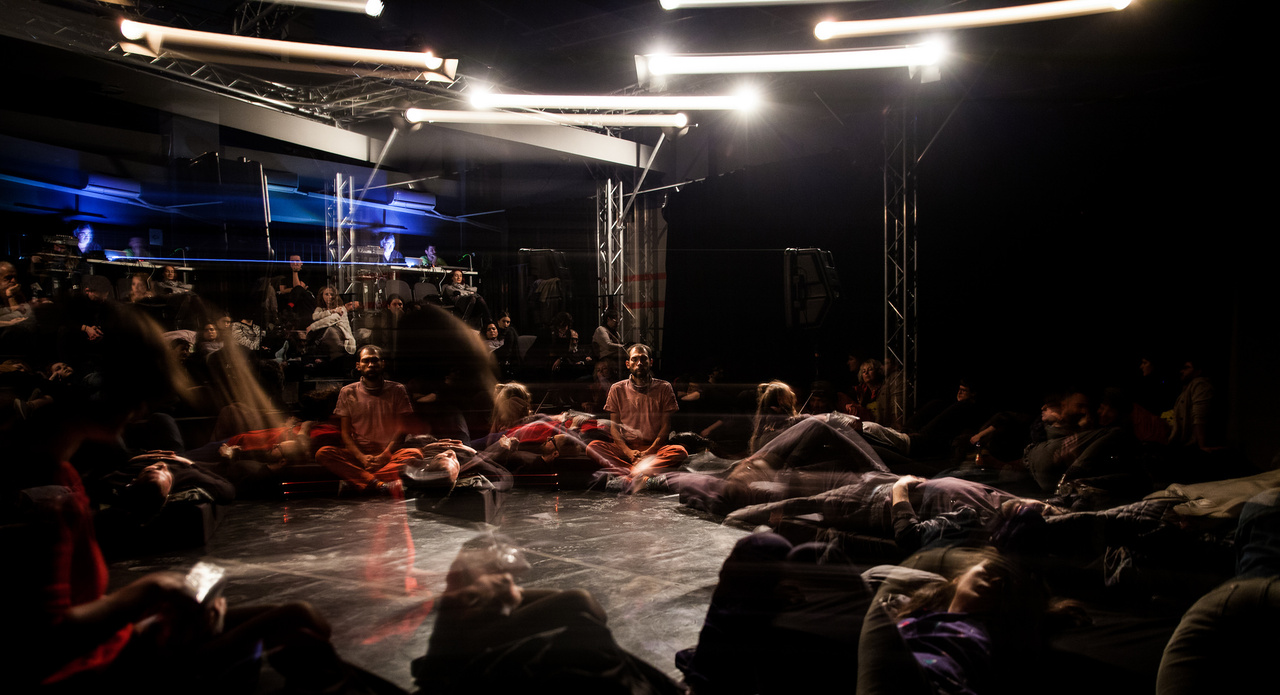Written by:
Marina Oprea
Share article:
A lettrist seance
He was born and grew up in Romania but moved to Paris shortly after World War II broke and later became a prominent figure of the avant-garde scene alongside the likes of Tristan Tzara and André Breton. His passion was poetry and, after conducting some serious research in the history of literature, he came to the conclusion that its current form was what he called amplic - simply following the same old blueprint for hundreds of years. It was time to enter the chiseling phase of poetry, starting with the most basic elements of writing and visual communication. Deconstructing and renewing the foundations of art was a major preoccupation among dadaists and surrealists alike, yet Isou wanted to separate himself from these movements. He identified the most basic elements of a poem as the letters - visual symbols and acoustic sounds devoid of semantic content - and began a formal revolution. New sounds and symbols were added, new configurations took shape, Lettrism was born, a purely formal type of poetry with no meaning. It infected all areas of the arts: painting, cinema, photography and of course, music. Isou had a long and outstanding career and is still a source of inspiration today.
Although born in Romania, Isou is virtually unknown in his native country, constantly overshadowed by the more famous Tristan Tzara and dadaism, something Lettrism was allegedly opposing. This is probably why the CNDB event debuted with a short excerpt from a documentary by the none other than Orson Wells, interviewing a young Isidore explaining Lettrism: a gibberish mix between known letters and other sounds like lip smacking, humming, whistling, all for acoustic effect. The sounds themselves mean nothing but they are definitely intriguing, sacrificing the discursive element of poetry for unheard-of voice modulations and resonance, resulting in a strange kind of music.
So Lettrism takes the shape of poetry, music, even dancing (since we are at the National Center for Dance) or all of them combined, as one of the evening's performers proceeded to demonstrate in a "Lettrist Recital". Loré Lixenberg is a Mezzo Soprano known for her wide range and quality of voice and her ability to fully immerse herself in any and all performances. It was only fitting for such an artist to grace us with her take on Lettrism by showcasing, for the first time in Romania, five works by Isou himself. I wouldn't call these works poems, but rather a series of signs and indications for spelling and pronouncing various sounds and unintelligible words along with gestures and actions that accompany them.
Of course, it's up to the artist to give it that personal touch and "spread the word", for Lettrism is more a visceral form of art, something you need not understand, but feel and fully experience; it's message could risk ringing hollow if it is not adequately performed. However Lixenberg did not disappoint, delivering her show with a lovely voice that beautifully dressed the made up words she was spewing on stage along with chirps, screams, murmurs and other sounds produced by her own body. What she was saying had essentially no dialectical meaning, but it was filled with emotion - the poem Cris pour 5.000.000 de juifs égorgés (1947) was comprised of German and Hebrew sounding words, coupled with wailing and cries. Other works had no words at all, just action indicators for the Lettrist on stage - Opus aphonistique n°1 (1959) was in fact a performance which included an inaudible monologue, Lixenberg running around the stage, rolling on the floor, slapping her own butt and other more or less humorous gestures.
Isidore Isou was 82 when he died and he dedicated his entire life to his art. He continued to work well into the twilight of his career, creating veritable symphonies of non-sense and reuniting musicians and composers with whom he saw eye to eye. Frédéric Acquaviva is one of Isou's main men, a self-thought experimental composer and an expert in Lettrism who worked with Isou on his musical projects. Acquaviva was with us during the event, since the grand master of Lettrism himself could not, to present one of Isou's musical masterpieces. Since a live performance was impossible, the next best thing would have to do: Symphony n°4 : Juvenal via live spatialisation on multiple speakers positioned strategically around the stage so that the spectators could walk around them and experience the various voice modulations. The symphony, which obviously wasn't following the typical format of a classic symphony, was comprised of multiple voices murmuring, hissing, humming sounds to the tone and rhythm of Isidore Isou's old raspy voice that had a magical quality to it. He wasn't saying anything of course, only occasionally dropping words in French one might understand, but they quickly lose their meaning in the bigger picture - words are only chosen for their resonances and how they could be coupled with other sounds for acoustic effect. The symphony takes the form of a trance like ritual where unknown words are muttered by the priest-like voices and strange whispers form the backdrop to this Lettrist seance.
The concert scene was repurposed into a meditation room, with big pillows and places to lounge everywhere for the guests to be able to fully immerse themselves in this audio experience. And the public did! We were all connecting with the ghost of Isidore Isou via his otherworldly chants and incantations, a mixture of what appeared to be French (no sign of a Romanian accent for anyone wondering) mangled up into an exotic mix. People were sitting or stretching on the pillows, some had their eyes closed, some were in the lotus positions while other were doing small performances themselves as if following the Lettrist rite of passage, an act that I'm sure Isidore Isou would have warmly welcomed.
*photo credits: Alina Usurelu / CNDB
